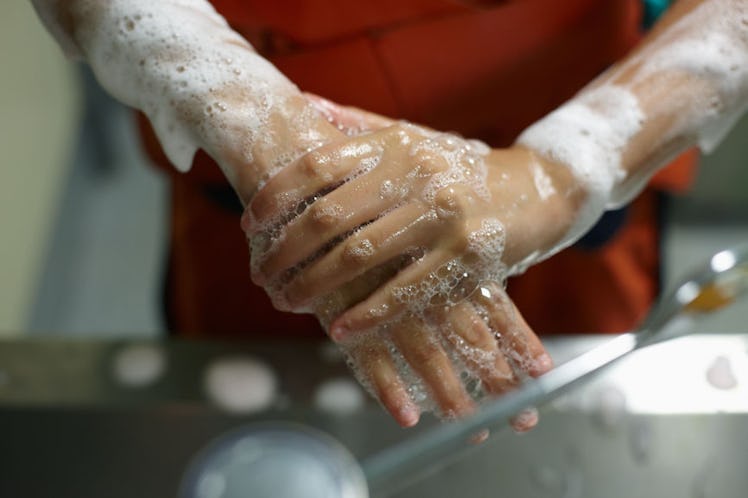
Science Says Washing Your Hands Might Not Actually Be The Best Way To Avoid Getting Sick
Cold and flu season is creeping up on us, friends, and unless you’re planning to sport a mask and pair of gloves throughout the fall and winter months, germs are likely to spread like wildfire. What’s especially irritating about this time is that you don’t even have to be intimate with someone to catch a viral bug. To reduce the chances of this, my dad always reminded me how important it was to wash my hands frequently, and diligently, but according to a new study, hand sanitizer may be better than hand washing — in other words, good ol’ soap and water might not be working as well as you need them to. So does the future of your hand hygiene depend on your buying bottles of Purell over the pumpkin-scented soap dispensers you’d normally stock up on this time of year? Since curious minds need to know, this curious mind consulted the experts to find out.
But first, let’s address this new research suggesting that hand washing is supposedly out, and that hand sanitizer is in. To keep a long story short, basically a paper published in the journal Pediatrics suggested that hand sanitizer helps ward off germs better than thorough, sudsy washing, CNN reports. The conclusion is based on data collected by researchers in Spain, who studied the effects that hand sanitizer had on the respiratory health of 911 children age 3 and under across 24 daycare centers.
Now, as someone who’s worked in daycare, I know from personal experience that children are germ magnets. I, along with my co-workers and the kids we watched, were always sneezing or coughing, especially once cold and flu season started back up again. So even though this particular study focused on children's health, it’s still an excellent point of reference, and it may say a lot in terms of just how effective hand sanitizer really is. If using hand sanitizer can prevent illness in children, just think of what it could do for adults.
So, back to the study — the children were split into three groups: The first group used hand sanitizer to clean their hands, the second followed standard hand-washing protocol using soap and water, and in the third group, the children were given the green light to continue following their own, usual hand-washing routines, CNN explained. All three groups attended hand hygiene workshops prior to the experiment, but the soap and sanitizer groups also attended follow-up seminars that went into more detail about respiratory infections, fevers, etc., and were instructed to have the children wash at certain times of day, including before and after they ate lunch, when they came home from daycare, as well as immediately after coughing, sneezing, or blowing their nose.
This experiment went on for a total of eight months, and according to the study's findings, the children were exposed to more than 5,000 respiratory infections during this time period, which translated to 5,186 daycare absences. Interestingly enough, though, the study found that children who were only given hand sanitizer to wash up throughout the day missed the least amount of daycare. Though, the group who washed with soap and water didn't trail too far behind them.
Now, before you run home and replace all of your soap bars and dispensers for miniature bottles of hand sanitizer, slow your roll, friend. According to Robert Glatter, M.D., an assistant professor of emergency medicine at Lenox Hill Hospital, Northwell Health, it’s still really important to wash your hands with soap and water. In fact, Glatter, who wasn’t involved in the study, tells Elite Daily he actually finds it “unexpected” that hand sanitizer would be more effective than the old-fashioned approach of using soap and water. However, he does go on to say that how you go about washing your hands on a daily basis is really what matters most in the end.
"When your hands are visibly soiled or dirty with debris, hand sanitizer is not the best approach," Glatter tells Elite Daily over email. "In this case, it's the mechanical action and scrubbing with soap and water — for 15 to 20 seconds — that helps remove dirt and debris." Still, he adds, hand sanitizer does serve a purpose. Glatter suggests rubbing a few drops all over your hands and in between your fingers "after eating, as well as after coughing or sneezing." Bottom line: Hand sanitizer is a great alternative for when you really can't make it to a sink, but more often than not, you really should be lathering up with soap and water under the faucet.
And, listen: According to the Bradley Corporation’s 2018 Healthy Hand Washing Survey, Americans make more of an effort to wash their hands during cold and flu season, which is great and all, but the United States Department of Agriculture found that, generally speaking, a whopping 97 percent of Americans aren’t washing their hands properly.
Look, I totally understand that hand washing is just one of those tasks that can feel so tedious, but trust me, friends — buy your seasonally fragranced soaps and a bottle of travel sanitizer, and use them. Your health, and the well-being of anyone who comes in contact with you, depends on it.